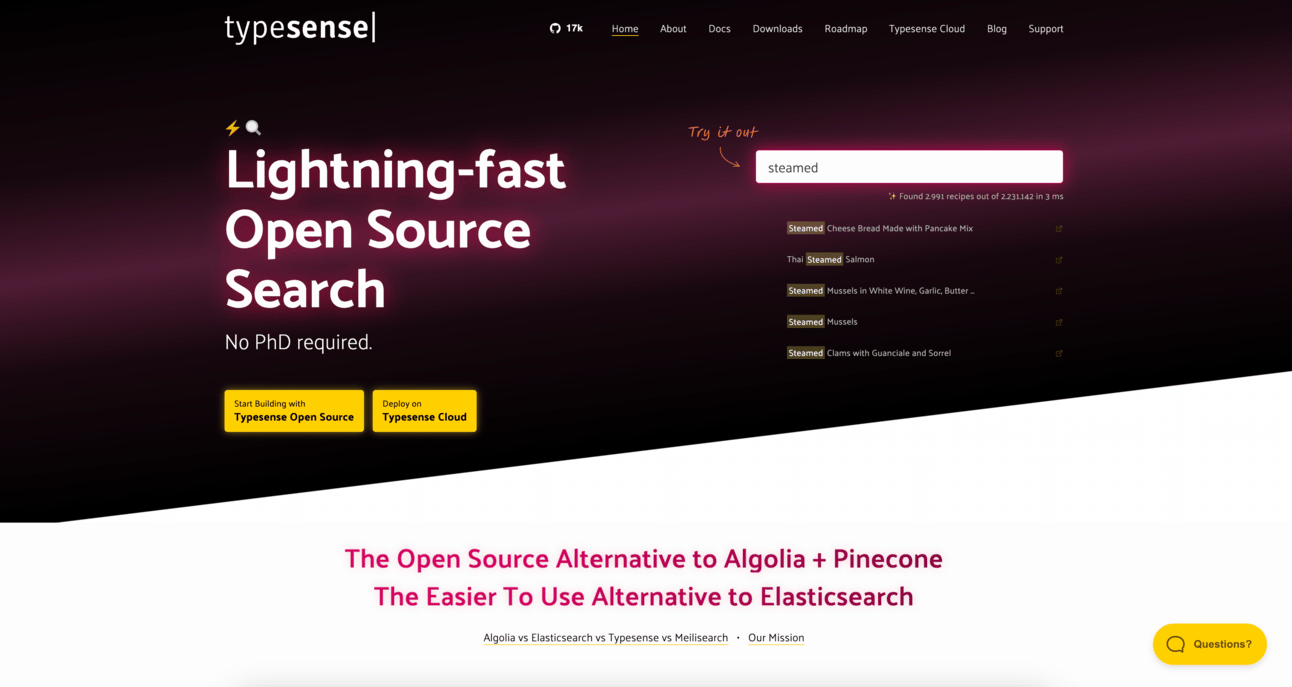Typesense
Open source alternative to Algolia • New projects: Devika, lumentis, Lapdev, Friend • Redis changes its open source license • 4 new funding rounds
Welcome to a new edition of Open Pioneers - your weekly update from the forefront of open source. Today, we talk about:
Typesense, an open source alternative to Algolia, Pinecone, and Elasticsearch
New open source projects, including another alternative to Devin, AI powered one-click docs, self-hosted remote dev environment, and an AI wearable
Redis changes it open source license
Fundraising news from Succint, Super AGI, Mermaid Chart, and OpenMeter
Since last week, we have welcomed 46 new Open Pioneers. 👋 If you like this week's post, it would make my day if you would share it with a friend or colleague.
🔍 Spotlight: Typesense

Typesense is an open source alternative to Algolia, Pinecone, and Elasticsearch. The product is a modern, privacy-friendly, open source search engine engineered for performance and ease-of-use. It uses cutting-edge search algorithms that take advantage of the latest advances in hardware capabilities and machine learning.
Typical use cases and features of Typesense include autocomplete search bars, fuzzy search, semantic search, and vector search. Check out this cool showcase that lets you search through 32 million songs.
A really exciting aspect about Typesense is that the company behind it has been fully bootstrapped and profitable for years. Typesense’s founder, Jason Bosco, is advocating for a more sustainable approach to commercial open source: without venture capital and without dubious enterprise pricing tactics.
Therefore, it's even more impressive what they have achieved since they started the open source project in 2019:
3b searches per month in their cloud offering
12m docker pulls
17k Github stars
The core of Typesense is distributed under the GPL-3.0 license.
Learn more about Typesense: Website | GitHub | Twitter
🔥 New open source projects started last week

AI powered one-click comprehensive docs from transcripts and text.
Self-Hosted Remote Dev Environment.

Open-Source AI Wearable with 24h+ on single charge.
github.com/BasedHardware/Friend
👀 Redis changes its open source license
Redis, the popular open-source in-memory data store, has announced changes to its licensing setup. Starting with Redis version 7.4, the software will be dual-licensed under the Redis Source Available License (RSALv2) and the Server Side Public License (SSPLv1). This marks a departure from Redis's previous use of the permissive Berkeley Software Distribution (BSD) license, which allowed developers to freely use the source code for commercial purposes.
The new "source available" licenses mean cloud service providers that host Redis solutions will now be required to enter into commercial agreements with Redis. The company says the motivation behind the license change is to allow it to "sustainably provide" Redis and invest in its development, as the previous model allowed cloud providers to "commoditize Redis' investments".
The move has been met with criticism from parts of the open source community, who see it as restricting the free and open use of Redis. Some Linux distributions are already discussing dropping Redis from their repositories due to the new licensing. However, there are already some Redis forks and alternatives, such as KeyDB and Garnet, that maintain permissive open source licenses.
Overall, the Redis licensing change reflects the ongoing tension between open source sustainability and commercial interests. While Redis aims to better monetize its popular project, this has sparked backlash from those who value the principles of free and open source software.
🦄 Fundraising news
Succint, working on ZK proofs, announced $55M in Seed + Series A funding. Link
Super AGI, a large model platform, announced their $10M Series A. Link
Mermaid Chart, offering text-based diagram and workflow tools, announced their $7.5M Seed. Link
OpenMeter, offering usage monetization with real-time metering for AI, announced their $3M Seed. Link
📚 More open source content
What I learned from looking at 900 most popular open source AI tools. Link
Top trending early-stage open-source startups by GitHub star growth in 2023. Link
Fireworks.ai open source API puts generative AI in reach of any developer. Link
Databricks unveils open source large language model. Link
Ensuring the open source moment continues. Link
Until next week,
Jonathan (@jonathimer)


